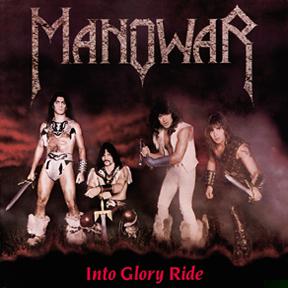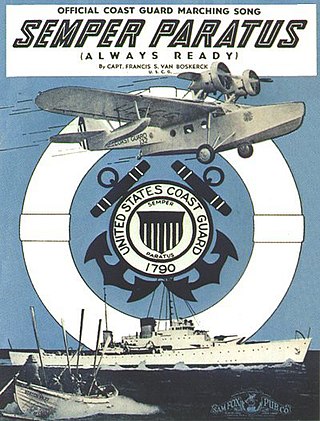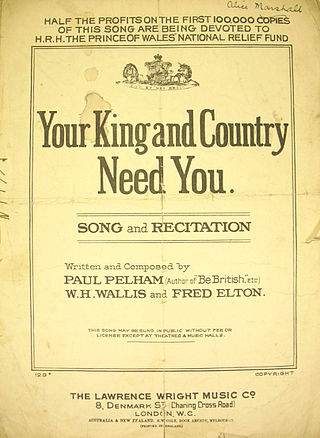
"John Brown's Body" is a United States marching song about the abolitionist John Brown. The song was popular in the Union during the American Civil War. The song arose out of the folk hymn tradition of the American camp meeting movement of the late 18th and early 19th century. According to an 1889 account, the original John Brown lyrics were a collective effort by a group of Union soldiers who were referring both to the famous John Brown and also, humorously, to a Sergeant John Brown of their own battalion. Various other authors have published additional verses or claimed credit for originating the John Brown lyrics and tune.

The "Battle Hymn of the Republic", also known as the "Mine Eyes Have Seen the Glory" or the "Glory, Glory Hallelujah" outside of the United States, is an American patriotic song that was written by abolitionist writer Julia Ward Howe during the American Civil War.

"Good Vibrations" is a song by the American rock band the Beach Boys that was composed by Brian Wilson with lyrics by Mike Love. It was released as a single on October 10, 1966 and was an immediate critical and commercial hit, topping record charts in several countries including the United States and the United Kingdom. Characterized by its complex soundscapes, episodic structure and subversions of pop music formula, it was at the time the most expensive single ever recorded. "Good Vibrations" later became widely acclaimed as one of the finest and most important works of the rock era.

The "Battle Cry of Freedom", also known as "Rally 'Round the Flag", is a song written in 1862 by American composer George Frederick Root (1820–1895) during the American Civil War. A patriotic song advocating the causes of Unionism and abolitionism, it became so popular that composer H. L. Schreiner and lyricist W. H. Barnes adapted it for the Confederacy.

Into Glory Ride is the second studio album by American heavy metal band Manowar and the first to feature drummer Scott Columbus. The album's title is a reference to the title track from the band's previous album Battle Hymns. After 'Into Glory Ride' released, Manowar became one of the most influential bands to the development of this "epic" style of heavy metal and had a critical influence on the genre.
The Aggie War Hymn is the war hymn of Texas A&M University; officially, the school does not have a fight song.

"The Bonnie Blue Flag", also known as "We Are a Band of Brothers", is an 1861 marching song associated with the Confederate States of America. The words were written by the entertainer Harry McCarthy, with the melody taken from the song "The Irish Jaunting Car". The song's title refers to the unofficial first flag of the Confederacy, the Bonnie Blue Flag. The left flag on the sheet-music is the Bonnie Blue Flag.

"Marching Through Georgia" is a marching song written by Henry Clay Work at the end of the American Civil War in 1865. The title and lyrics of the song refer to U.S. Army major general William T. Sherman's "March to the Sea" to capture the Confederate city of Savannah, Georgia in late 1864.
"Sussex by the Sea" is a song written in 1907 by William Ward-Higgs, often considered to be the unofficial county anthem of Sussex. It became well known throughout Sussex and is regularly sung at celebrations throughout the county. It can be heard during many sporting events in the county, during the Sussex bonfire celebrations and it is played by marching bands and Morris dancers across Sussex. It is the adopted song of Brighton & Hove Albion Football Club, Sussex Division Royal Naval Reserve, Sussex Association of Naval Officers and Sussex County Cricket Club.

"The U.S. Air Force" is the official song of the United States Air Force, adopted in the late 1940s, and is often referred to as "Wild Blue Yonder".
"The Preacher and the Slave" is a song written by Joe Hill in 1911. It was written as a parody of the Christian hymn "In the Sweet By-and-By". Copying or using the musical style of the hymn was also a way to capture the emotional resonance of that style of music and use it for a non-religious purpose.

"Semper Paratus" is a 1928 song and the official march of the United States Coast Guard, having been composed in 1927 by U.S. Coast Guard Captain Francis Saltus Van Boskerck.

"Tenting on the Old Camp Ground" was a popular song during the American Civil War. A particular favorite of enlisted men in the Union army, it was written in 1863 by Walter Kittredge and first performed in that year at Old High Rock, Lynn, Massachusetts.

Hodie is a cantata by Ralph Vaughan Williams. Composed between 1953 and 1954, it is the composer's last major choral-orchestral composition, and was premiered under his baton at Worcester Cathedral, as part of the Three Choirs Festival, on 8 September 1954. The piece is dedicated to Herbert Howells. The cantata, in 16 movements, is scored for chorus, boys' choir, organ and orchestra, and features tenor, baritone, and soprano soloists.
The following is a list of the Top 10 Films chosen annually by the National Board of Review of Motion Pictures, beginning in 1929.

"Spanish Ladies" is a traditional British naval song, describing a voyage from Spain to the Downs from the viewpoint of ratings of the Royal Navy.

"Hard Tack, Come Again No More" is an American Civil War-era parody of the song "Hard Times, Come Again No More." First called "Hard Crackers, Come Again No More!", it is a sarcastic complaint about the quality of some of the provisions provided by military contractors, specifically hardtack. The authors of the many verses of the parody are unknown, although the first version is often attributed to Josiah Fowler of the First Iowa Infantry dating to just after the Battle of Boonville, June 1861.
"Send It to Me" is a song by English rock and roll band the Rolling Stones featured on the 1980 album Emotional Rescue.

Several different recruiting songs with the name "Your King and Country Want/Need You" were popularised in Britain at the beginning of the First World War. Your King and Country Need You was a popular song and recitation, with words by Paul Pelham, and music by W. H. Wallis and Fred Elton, published in London at the start of the war in 1914 by Lawrence Wright Music. It was written as a recruiting song with the aim of persuading men to volunteer to fight in the War. Half the profits on the first 100,000 copies were to be given to the "H.R.H. Prince of Wales' National Relief Fund".













